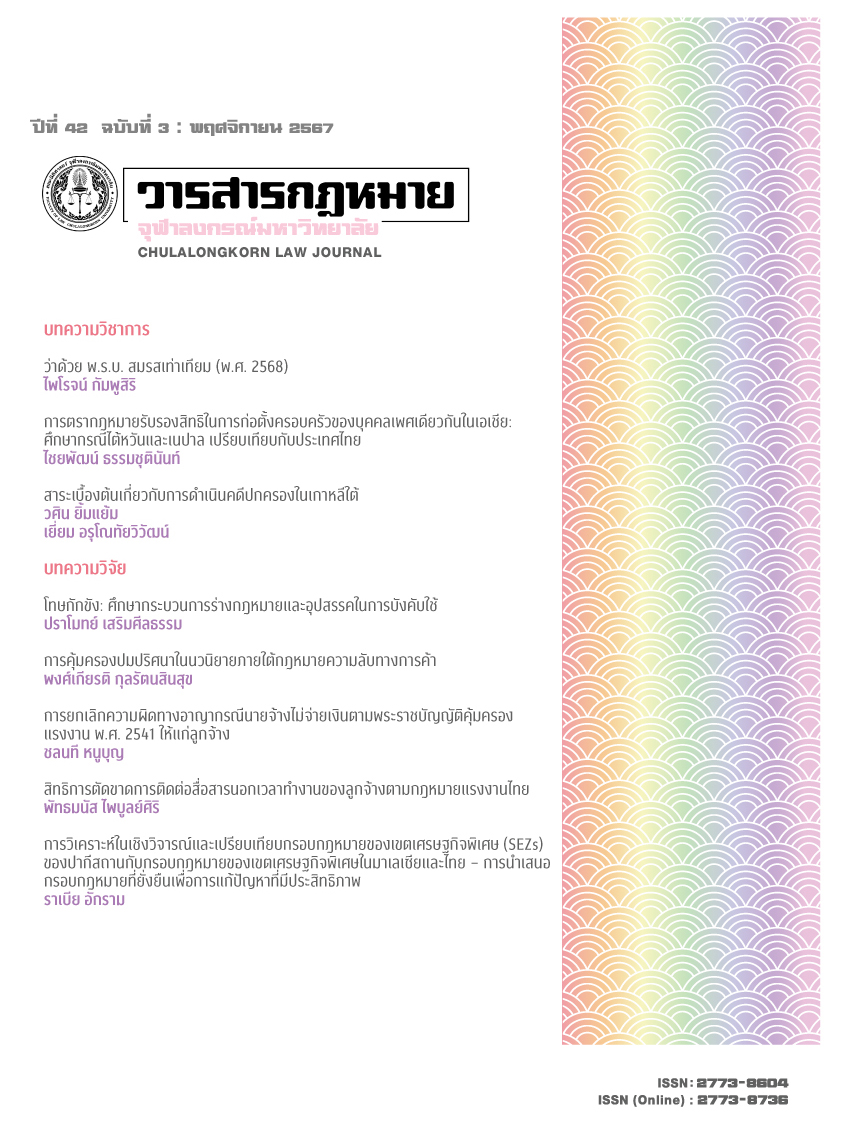โทษกักขัง: ศึกษากระบวนการร่างกฎหมายและอุปสรรคในการบังคับใช้
Main Article Content
บทคัดย่อ
โทษกักขังเป็นโทษที่ถูกบัญญัติขึ้นใหม่เมื่อคราวที่ประเทศไทยมีการประกาศใช้ประมวลกฎหมายอาญา พ.ศ. 2499 โดยมีวัตถุประสงค์เพื่อหลีกเลี่ยงการรับโทษจำคุกที่ไม่จำเป็นสำหรับผู้กระทำความผิดเล็กน้อยซึ่งถือได้ว่าแนวคิดดังกล่าวเป็นแนวคิดที่มีความก้าวหน้ามากในสมัยนั้น อย่างไรก็ตาม จากการศึกษาพบว่าโทษกักขังแม้จะเป็นโทษใหม่ในประมวลกฎหมายอาญาแต่โทษกักขังกลับเป็นโทษที่มิได้มีการศึกษาต่ออย่างละเอียดหรือมีการบังคับใช้กันมากนักเมื่อเทียบกับโทษประเภทอื่น ๆ ในปัจจุบัน อนึ่ง หากนับตั้งแต่เมื่อมีมติคณะรัฐมนตรีในการพิจารณาแก้ไขปรับปรุงกฎหมายลักษณะอาญา ร.ศ. 127 ในปี พ.ศ. 2481 จนกระทั่งประมวลกฎหมายอาญามีผลบังคับใช้เมื่อวันที่ 1 มกราคม พ.ศ. 2500 ประเทศไทยใช้ระยะเวลาทั้งสิ้นเกือบ 20 ปีในการจัดทำประมวลกฎหมายอาญาฉบับดังกล่าว ซึ่งหากศึกษาถึงพัฒนาการตลอดระยะเวลาในการจัดทำประมวลกฎหมายอาญาจะพบว่าเรื่องโทษกักขังมิได้เกิดขึ้นตั้งแต่การจัดทำในร่างประมวลกฎหมายอาญาในช่วงแรก ๆ แต่เป็นแนวคิดที่เกิดขึ้นในระหว่างการจัดทำในช่วงต่อมาและกว่าที่โทษกักขังจะได้มีรูปแบบตามที่ปรากฏอยู่ในประมวลกฎหมายอาญาฉบับปัจจุบันก็มีการขัดเกลาแก้ไขเพิ่มเติมในแต่ละชั้นที่พิจารณามาโดยตลอด การศึกษาถึงเหตุผลที่ผ่านการถกเถียงแลกเปลี่ยนในแต่ละชั้นที่ได้รับการพิจารณาจะทำให้ทราบถึงเจตนารมณ์ที่แท้จริงของบทบัญญัติดังกล่าวได้เป็นอย่างดีและควรค่าแก่การศึกษาเพื่อนำไปปรับปรุงให้เกิดประสิทธิภาพในการนำมาใช้ต่อไป
Article Details

อนุญาตภายใต้เงื่อนไข Creative Commons Attribution-NonCommercial-NoDerivatives 4.0 International License.
ลิขสิทธิ์และเนื้อหาในเว็บไซต์ของวารสารกฎหมาย (รวมถึง โดยไม่จำกัดเฉพาะ เนื้อหา รหัสคอมพิวเตอร์ งานศิลป์ ภาพถ่าย รูปภาพ ดนตรีกรรม โสตทัศนวัสดุ) เป็นกรรมสิทธิ์ของวารสารกฎหมาย และผู้ได้รับการโอนสิทธิทุกราย
1. วารสารกฎหมาย ให้อนุญาตให้คุณใช้สิทธิอันไม่เฉพาะเจาะจงที่สามารถถูกถอนเมื่อใดก็ได้ โดยไม่มีค่าใช้จ่าย ในการ
- เยี่ยมชมเว็บไซต์และเอกสารในเว็บไซต์นี้ จากคอมพิวเตอร์หรือเครื่องมือสื่อสารผ่านเว็บบราวเซอร์
- คัดลอกและจัดเก็บเว็บไซต์และเอกสารในเว็บไซต์นี้บนลงคอมพิวเตอร์ของคุณผ่านระบบความจำ cache
- สั่งพิมพ์เอกสารจากเว็บไซต์นี้สำหรับการใช้ส่วนตัวของคุณ
- ผลงานที่ได้รับการตีพิมพ์โดยวารสารกฎหมาย จุฬาลงกรณ์มหาวิทยาลัย ถูกคุ้มครองภายใต้ Creative Commons Attribution 4.0 International License ซึ่งอนุญาตให้ทุกคนสามารถคัดลอก แจกจ่าย ดัดแปลง ส่งต่อ ผลงานได้ ก็ต่อเมื่อผลงานและแหล่งข้อมูลได้รับการอ้างอิงอย่างเหมาะสม
2. วารสารกฎหมาย จุฬาลงกรณ์มหาวิทยาลัย สงวนสิทธิ์ไม่อนุญาตให้คุณใช้สิทธิอื่นใดที่เกี่ยวข้องกับเว็บไซต์และเอกสารบนเว็บไซต์นี้ เช่น การคัดลอก ดัดแปลง เปลี่ยนแปลง ส่งต่อ ตีพิมพ์ แจกจ่าย เผยแพร่ จัดแสดงในที่สาธารณะ ไม่ว่าจะในรูปแบบใดก็ตาม ซึ่งเว็บไซต์หรือเอกสารบนเว็บไซต์ โดยไม่อ้างอิงถึงแหล่งข้อมูลหรือโดยไม่ได้รับอนุญาตเป็นลายลักษณ์อักษรจากวารสารกฎหมาย จุฬาลงกรณ์มหาวิทยาลัย
3. คุณอาจขออนุญาตที่จะใช้เอกสารอันมีลิขสิทธิ์บนเว็บไซต์นี้โดยการเขียนอีเมลล์มายัง journal@law.chula.ac.th
4. วารสารกฎหมาย จุฬาลงกรณ์มหาวิทยาลัย เข้มงวดกับการคุ้มครองลิขสิทธิ์อย่างมาก หากวารสารกฎหมาย จุฬาลงกรณ์มหาวิทยาลัยพบว่าคุณได้ใช้เอกสารอันมีลิขสิทธิ์บนเว็บไซต์นี้โดยไม่ถูกต้องตามการอนุญาตให้ใช้สิทธิ ดังที่กล่าวไปข้างต้น วารสารกฎหมาย จุฬาลงกรณ์มหาวิทยาลัยอาจดำเนินคดีตามกฎหมายต่อคุณได้ เพื่อเรียกร้องค่าเสียหายที่เป็นตัวเงินและคำขอชั่วคราวให้คุณหยุดการใช้เอกสารดังกล่าว ทั้งนี้ คุณอาจถูกสั่งให้ชดใช้ค่าใช้จ่ายใดๆ ที่เกี่ยวข้องกับการดำเนินการตามกฎหมายนี้
หากคุณพบเห็นการใช้เอกสารอันมีลิขสิทธิ์ของวารสารกฎหมาย จุฬาลงกรณ์มหาวิทยาลัย ที่ขัดหรืออาจขัดต่อการอนุญาตให้ใช้สิทธิดังที่ได้กล่าวไปข้างต้น โดยเชื่อว่าได้ละเมิดลิขสิทธิ์ของคุณหรือของผู้อื่น สามารถร้องเรียนมาได้ที่ journal@law.chula.ac.th
เอกสารอ้างอิง
Article 723-8 du Code de procédure pénale
BBC NEWS ไทย, ““กักขัง” กับ “จำคุก” ต่างกันอย่างไร หลังศาลสั่ง กักขัง “เพนกวิน” 15 วัน” [ออนไลน์] แหล่งที่มา : https://www.bbc.com/thai/thailand-56484210 [20 ตุลาคม 2567]; กรุงเทพธุรกิจ, “โทษ “กักขัง” ...เป็นไฉน?” [ออนไลน์] แหล่งที่มา : https://www.bangkokbiznews.com/politics/698812 [20 ตุลาคม 2567]
Jean Pradel, Droit pénal comparé, 3e éd (DALLOZ, 2008)
Subpart 2A—Home detention of Sentencing Act 2002
United Nations, “United Nations Standard Minimum Rules for Non-Custodial Measures (The Tokyo Rules): GENERAL PRINCIPLES - Fundamental Aims,” [online] Available from : https://www.ojp.gov/pdffiles1/Digitization/147416NCJRS.pdf [19 October 2024]
กรมประชาสัมพันธ์, “โฆษกรัฐบาลเผย ครม. มีมติพิจารณาทบทวนมาตรการกักขังแทนค่าปรับ เพื่อให้สอดคล้องกับหลักนิติธรรมและหลักสิทธิมนุษยชน มอบกฤษฎีกาฯ แก้ไขกฎหมายที่เกี่ยวข้อง โดยถือเป็นเรื่องด่วน” [ออนไลน์] แหล่งที่มา : https://www.prd.go.th/th/content/category/detail/id/39/iid/196324 [20 ตุลาคม 2567]
กรมราชทัณฑ์, “การติดตามผลการดำเนินงานด้านการปฏิบัติต่อผู้ต้องกักขังกรมราชทัณฑ์” [ออนไลน์] แหล่งที่มา : https://jkb.oja.go.th/home/view/500 [20 ตุลาคม 2567]
กรมราชทัณฑ์, “รายงานสถิติผู้ต้องราชทัณฑ์ทั่วประเทศสำรวจ ณ วันที่ 1 ตุลาคม 2567” [ออนไลน์] แหล่งที่มา : http://www.correct.go.th/rt103pdf/report_result.php?date=2024-10-01&report= [19 ตุลาคม 2567]
การประชุมสภาผู้แทนราษฎร ครั้งที่ 12/2499 (6 กันยายน 2499) การประชุมสภาผู้แทนราษฎร ครั้งที่ 13/2499 (8 กันยายน 2499) และการประชุมสภาผู้แทนราษฎร ครั้งที่ 14/2499 (10 กันยายน 2499)
คณพล จันทน์หอม. วิเคราะห์กฎหมายลักษณะอาญา ร.ศ. 127 : ศึกษากระบวนการร่างกฎหมายและประเด็นความรับผิดในทางอาญา. วิทยานิพนธ์ปริญญามหาบัณฑิต คณะนิติศาสตร์ จุฬาลงกรณ์มหาวิทยาลัย, 2545
คณะกรรมการกฤษฎีกา, รายงานการประชุมอนุกรรมการตรวจพิจารณาแก้ไขประมวลกฎหมายอาญา ครั้งที่ 1, 3/2482, 10 พฤษภาคม 2482
คณะกรรมการกฤษฎีกา, รายงานการประชุมอนุกรรมการตรวจพิจารณาแก้ไขประมวลกฎหมายอาญา ครั้งที่ 8, 26/2482, 8 มิถุนายน 2482 และรายงานการประชุมอนุกรรมการตรวจพิจารณาแก้ไขประมวลกฎหมายอาญา ครั้งที่ 9, 28/2482, 10 มิถุนายน 2482
คณะนิติศาสตร์ จุฬาลงกรณ์มหาวิทยาลัย, การบังคับใช้โทษทางอาญาประเภทอื่นที่มิได้มีอยู่ในประมวลกฎหมายอาญาของไทย, (สำนักงานกิจการยุติธรรม, 2554)
คำพิพากษาศาลฎีกาที่ 1298/2539
คำพิพากษาศาลฎีกาที่ 2754/2517
คำพิพากษาศาลฎีกาที่ 403/2517
คำพิพากษาศาลฎีกาที่ 6724/2562 ป.อ. มาตรา 23
จิตติ ติงศภัทิย์, กฎหมายอาญา ภาค 1, พิมพ์ครั้งที่ 11 (กรุงเทพมหานคร: เนติบัณฑิตยสภา, 2555)
ชูเชิด รักตะบุตร์, “โทษกักขังแทนโทษจำคุก”, บทบัณฑิตย์, 28, 4 (2514): 482.
โชค จารุจินดา, “รายงานการประชุมร่างประมวลกฎหมายอาญาและบันทึกประกอบ มาตรา 12-22”, ดุลพาห, 2, 8 (กุมภาพันธ์ 2504): 173.
โชค จารุจินดา, “รายงานการประชุมร่างประมวลกฎหมายอาญาและบันทึกประกอบ มาตรา 23-30”, ดุลพาห, 5, 8 (พฤษภาคม 2504): 533-534.
ณรงค์ ใจหาญ, กฎหมายอาญาว่าด้วยโทษและวิธีการเพื่อความปลอดภัย, (กรุงเทพมหานคร: วิญญูชน, 2543)
ทวีเกียรติ มีนะกนิษฐ, “กักขังแทนค่าปรับไม่ใช่โทษกักขัง”, วารสารกฎหมายใหม่, 2, 34 (2547): 46.
ทวีเกียรติ มีนะกนิษฐ, “จำคุกผ่อนส่ง”, วารสารนิติศาสตร์, 14, 4 (2527): 31.
ปกป้อง ศรีสนิท, กฎหมายอาญาชั้นสูง, พิมพ์ครั้งที่ 1 (กรุงเทพมหานคร: วิญญูชน, 2559)
พิพัฒน์ จักรางกูร, “โทษกักขัง”, บทบัณฑิตย์, 23, 2 (2508): 404.
พิพัฒน์ จักรางกูร, “เปลี่ยนโทษกักขังเป็นโทษจำคุก”, วารสารกฎหมาย คณะนิติศาสตร์ จุฬาลงกรณ์มหาวิทยาลัย, 2, 1 (2519): 53.
พิพัฒน์ จักรางกูร, “เปลี่ยนโทษกักขังเป็นโทษจำคุก”, ดุลพาห, 21, 2 (2517): 34.
มาตรา 35 พระราชบัญญัติราชทัณฑ์ พุทธศักราช 2479
มาตรา 36 พระราชบัญญัติระเบียบข้าราชการพลเรือน พุทธศักราช 2551
มาตรา 40 กฎหมายลักษณะอาญา ร.ศ. 127
มาตรา 41 กฎหมายลักษณะอาญา ร.ศ. 127
มาตรา 5 พระราชบัญญัติกักกันผู้มีสันดานเป็นผู้ร้าย พุทธศักราช 2479
มาตรา 55 ประมวลกฎหมายอาญา
มาตรา 56 วรรคแรก (6) ประมวลกฎหมายอาญา
มาตรา 7 พระราชบัญญัติแก้ไขเพิ่มเติมประมวลกฎหมายอาญา (ฉบับที่ 25) พุทธศักราช 2559
มาตรา 8 พระราชบัญญัติแก้ไขเพิ่มเติมประมวลกฎหมายอาญา (ฉบับที่ 15) พุทธศักราช 2545
ร่างเดิมเมื่อครั้งยื่นในปี พ.ศ. 2494 แต่ได้มีการปรับปรุงเรียงลำดับเลขมาตราใหม่
รายงานการประชุมวุฒิสภา ครั้งที่ 29 (สมัยสามัญนิติบัญญัติ) เป็นพิเศษ วันที่ 25 พฤศจิกายน พ.ศ. 2545
รายงานการประชุมวุฒิสภา ครั้งที่ 39 (สมัยสามัญนิติบัญญัติ) เป็นพิเศษ วันที่ 27 พฤศจิกายน พ.ศ. 2544
รายงานการประชุมสภาผู้แทนราษฎร ครั้งที่ 11/2495
รายงานการประชุมสภาผู้แทนราษฎร ครั้งที่ 13/2499
รายงานการประชุมสภาผู้แทนราษฎร ครั้งที่ 19/2492
รายงานการประชุมสภาผู้แทนราษฎร ครั้งที่ 23/2489
รายงานการประชุมสภาผู้แทนราษฎร ครั้งที่ 4/2494
รายงานการประชุมสภาผู้แทนราษฎร ชุดที่ 21 ปีที่ 1 ครั้งที่ 3 สมัยสามัญนิติบัญญัติ (วันที่ 8 สิงหาคม 2544), ศูนย์ชวเลขและพิมพ์ดีด สำนักงานเลขาธิการสภาผู้แทนราษฎร
รายงานการประชุมสภาผู้แทนราษฎร ชุดที่ 21 ปีที่ 1 ครั้งที่ 31 สมัยสามัญนิติบัญญัติ (วันที่ 14 พฤศจิกายน 2544), ศูนย์ชวเลขและพิมพ์ดีด สำนักงานเลขาธิการสภาผู้แทนราษฎร
รายงานการประชุมอนุกรรมการฯ ครั้งที่ 628/235/2487 วันที่ 2 สิงหาคม 2487 อ้างถึงใน โชค จารุจินดา, “รายงานการประชุมร่างประมวลกฎหมายอาญาและบันทึกประกอบ มาตรา 28-30”, ดุลพาห, 6, 8 (มิถุนายน 2504): 646-648
วิชิต บุญถนอม, “การกักขังแทนค่าปรับเป็นโทษหรือไม่”, ดุลพาห, 15, 3 (พฤษภาคม-มิถุนายน 2511): 118-121.
วินัย ทองลงยา, กฎหมายอาญา เล่ม 1 ภาคบทบัญญัติทั่วไป, (กรุงเทพมหานคร: มหาวิทยาลัยรามคำแหง, 2514)
สถานกักขังกลางจังหวัดตราด, “เกี่ยวกับเรา” [ออนไลน์] แหล่งที่มา : http://www.correct.go.th/inctrad/ [20 ตุลาคม 2567]
สถานกักขังกลางจังหวัดปทุมธานี, “ข้อมูลพื้นฐาน” [ออนไลน์] แหล่งที่มา : http://www.correct.go.th/idcpatu/2022/index.php/m-abounts/ms-basebasic [20 ตุลาคม 2567]
สถานกักขังกลางจังหวัดลำปาง, “ประวัติความเป็นมา” [ออนไลน์] แหล่งที่มา : http://www.correct.go.th/idclamp/link/correct_history.html [20 ตุลาคม 2567]
สมพร พรหมหิตาธร, “โทษกักขัง”, อัยการนิเทศ, 3, 34 (2515): 326-327.
สำนักงานเลขาธิการสภาผู้แทนราษฎร, “การประชุมคณะกรรมาธิการวิสามัญพิจารณาร่างประมวลกฎหมายอาญา”, รัฐสภาสาร, 1, 24 (ตุลาคม 2496): 21.
สำนักงานเลขาธิการสภาผู้แทนราษฎร, “การประชุมคณะกรรมาธิการวิสามัญพิจารณาร่างประมวลกฎหมายอาญา”, รัฐสภาสาร, 1, 5 (เมษายน 2496): 95.
สำนักแผนงานและงบประมาณ, “หนังสือรายงานสถิติคดีของศาลยุติธรรมประจำปีพุทธศักราช (ฉบับภาษาไทย)” [ออนไลน์] แหล่งที่มา : https://oppb.coj.go.th/th/content/category/articles/id/8/cid/2085 [19 ตุลาคม 2567]
หยุด แสงอุทัย, คำบรรยายประมวลกฎหมายอาญา, พิมพ์ครั้งที่ 4 (พระนคร: โอเดียนสโตร์, 2514)
อุททิศ แสนโกศิก, กฎหมายอาญาภาค 1, (กรุงเทพมหานคร: ศูนย์บริการเอกสารและวิชาการ กองวิชาการ กรมอัยการ, 2525)


